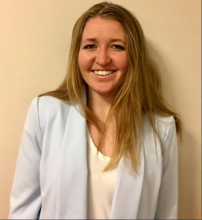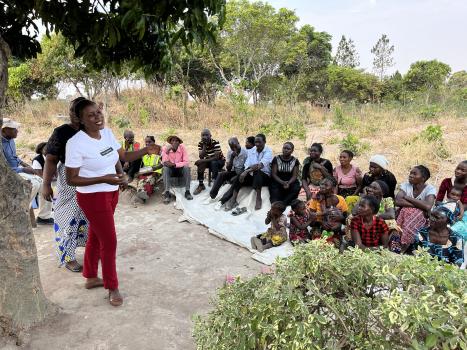
Photo credit: James Winter, USAID
Zambia, a country where over six million people lack access to safe water and 11 million are without access to basic sanitation services, was recently added to USAID’s list of Global Water Strategy High Priority Countries – a list of more than 20 countries where USAID focuses its water and sanitation investments. The designation reflects both the tremendous needs in the country, as well as enormous opportunity for impact. Zambia stands out as a democratic “bright spot,” and its new administration has unleashed a wave of optimism and new public and private investment that is leaving no sector untouched.
Less than a year after being designated a GWS HPC, the Zambian government made an even more ambitious investment in water and sanitation under its new administration, committing over $6 billion for water and sanitation services and water resources management initiatives. “It’s a really substantial contribution: four times higher than the previous commitment,'' says Mundia Matongo, USAID/Zambia’s WASH lead for the program.
Similarly, the Zambian government has renewed its commitment to engaging the private sector, which has created an opportunity to increase access to high-quality, affordable services for millions of people. Matongo explains, “One of the biggest changes in the last year is that the new Zambia administration is private sector focused. They realize that the biggest area for growth - for the whole development sector basically - is the private sector.”
To support the government and its ambitious water and sanitation agenda, USAID/Zambia is pursuing updated approaches that considers lessons learned, elevates the private sector, and integrates the latest evidence to bring sustainable services to even larger numbers of people.
Building on Evidence and Lessons Learned
Research suggests strong linkages between diarrheal disease and stunting, often resulting from lack of basic sanitation. Because of this, USAID has prioritized improving access to sanitation by working closely with the local government, traditional leaders, and community volunteers in 13 districts to support the efforts of all residents to build toilets and handwashing facilities through the USAID Scaling Up Nutrition (SUN-TA) activity. As the mission’s flagship livelihoods, nutrition, and WASH program, USAID is investing $70 million in layered interventions to improve development outcomes in Zambia from 2017-2023. This sanitation investment has paid dividends: USAID SUN-TA has so far helped over one million people gain access to basic sanitation and handwashing services. At the same time, the self-reported incidence of diarrheal disease was said to have been reduced by nearly 50 percent in the six key wards.

Photo credit: SUN-TA Zambia
Yet we know we cannot stop at basic sanitation. People want and need something aspirational--something beyond a basic hole in the ground with a mud superstructure. They want a latrine with a stable foundation and an easy-to-clean surface, but they can’t always afford it. Promoting livelihoods can spur major improvements in sanitation because the quality of latrine you build is a function of how much money you have. While USAID SUN-TA is excelling at helping households in target areas construct basic toilets through both demand creation and livelihood support, Matongo says, “basic services are not the endpoint. There’s tremendous potential to continue improving.”

Photo credit: James Winter, USAID
That’s where the new USAID Expanding WASH program comes in. This program is “deliberate about creating a system for supply chains to support an aspirational level of sanitation services,” explains Matongo, which will build on gains made through USAID SUN-TA with new emphasis on supporting the private sector to deliver sanitation services. “Having a nicer, cleaner toilet means people want to use them regularly,” and that means profits for entrepreneurs. USAID Expanding WASH is supporting sanitation businesses to professionalize their services and reach more customers in the hopes of increasing profit margins and operational scale.
USAID Expanding WASH exemplifies the Agency’s updated priorities under the recently released 2022-2027 Global Water Strategy that puts market-based approaches front and center. Private sector partnerships are critical for reaching the Strategy’s targets, as the private sector involvement can increase access to financing for the water and sanitation sector, promote market-based solutions, and improve sustainable operations of water supply systems.
For this democratic bright spot, USAID hopes to play a meaningful part in helping deliver sustainable and tangible benefits to all Zambians.

Photo credit: SUN-TA Zambia

About The Author
Natalie Rose Gill
Strategic Communications and Policy Advisor in USAID’s Center for Water Security, Sanitation and Hygiene. Since joining USAID in 2021, Natalie has supported USAID’s efforts to increase global water security through the implementation of the U.S. government’s Global Water Strategy. Natalie earned her bachelor's and master's degrees in history from the University of Maryland.

About The Author
Dr. James Winter
WASH Adviser at USAID in the Bureau for Global Health with 10 years of experience studying water supply, sanitation, and hygiene. James began working in the water sector as a volunteer at a local NGO in El Salvador, conducting water quality tests, distributing clay pot water filters, and assisting local hospitals with basic data analysis. After returning to the U.S. (and after a few detours), James began his PhD at Stanford University in Civil & Environmental Engineering, focusing on the role of rural piped water supply in time allocation, water quality, and food security in Zambia. He has spent almost two years living in Zambia, including a year pursuing a U.S. Fulbright Fellowship.
Related resources
- To learn more about Zambia’s activities:
- To learn more about how USAID selects its high-priority countries, check out the WASH Needs Index.
- For guidance for developing and implementing rural sanitation activities, including area-wide approaches, read the USAID Technical Brief on Rural Sanitation.


